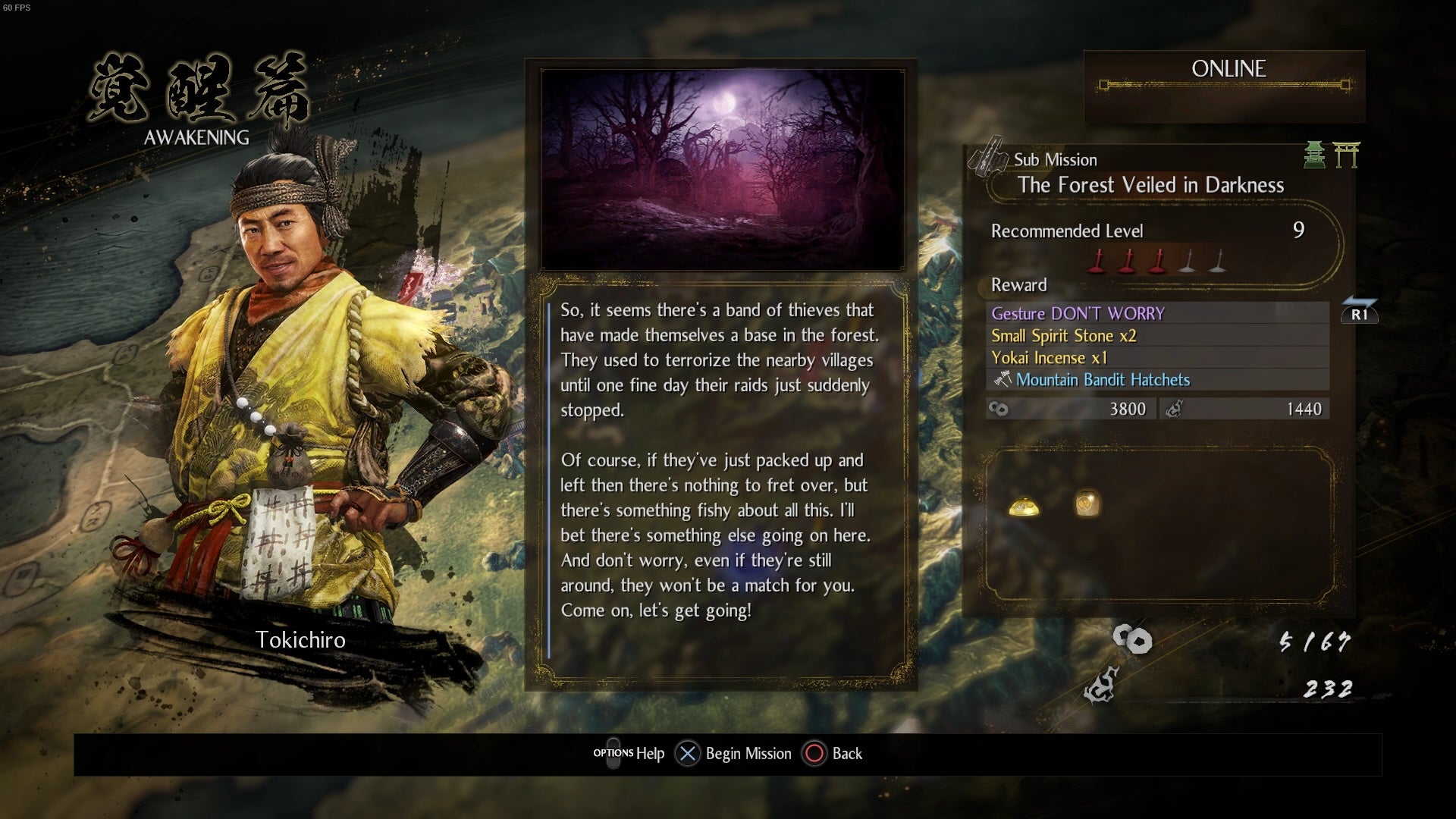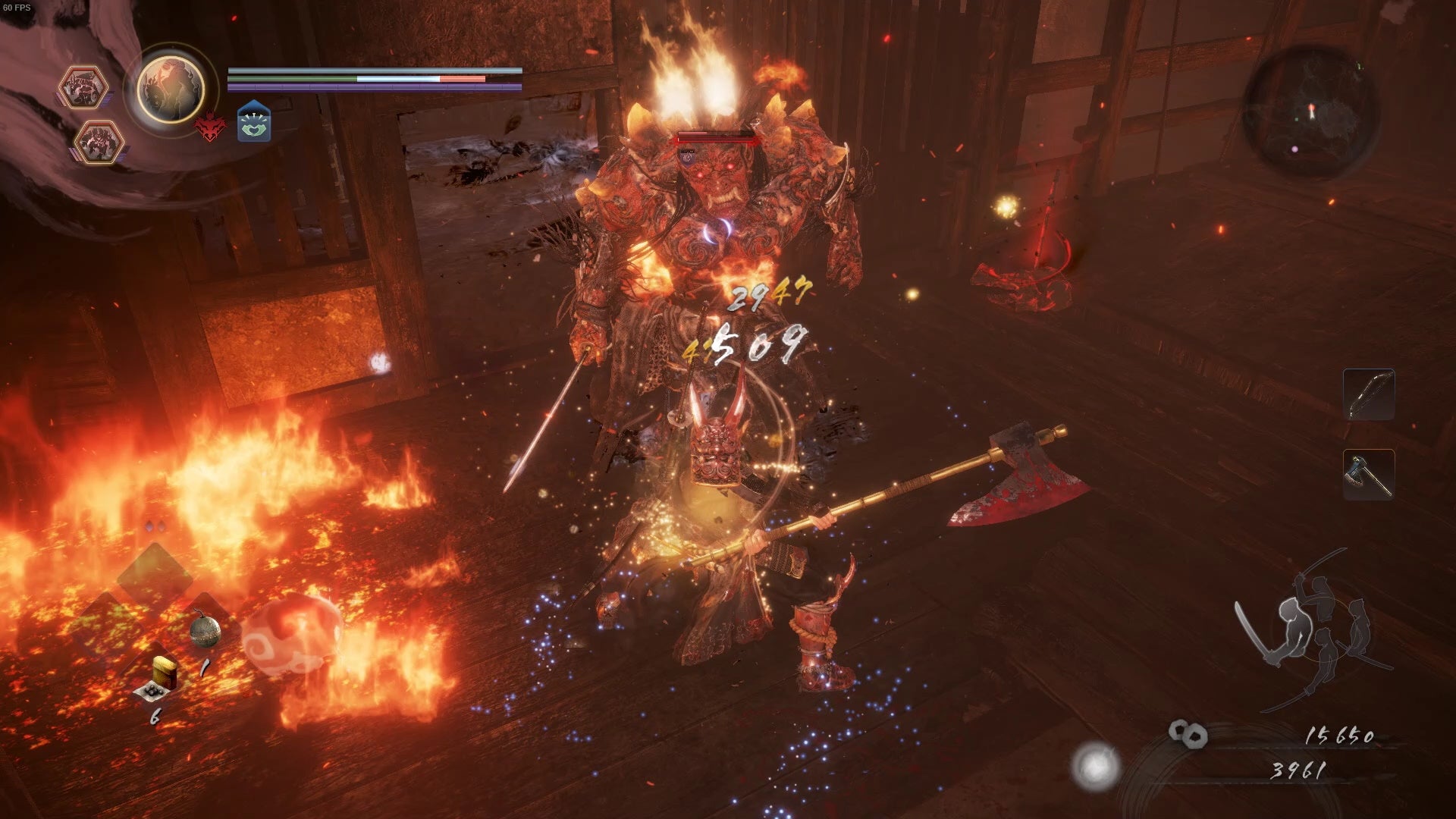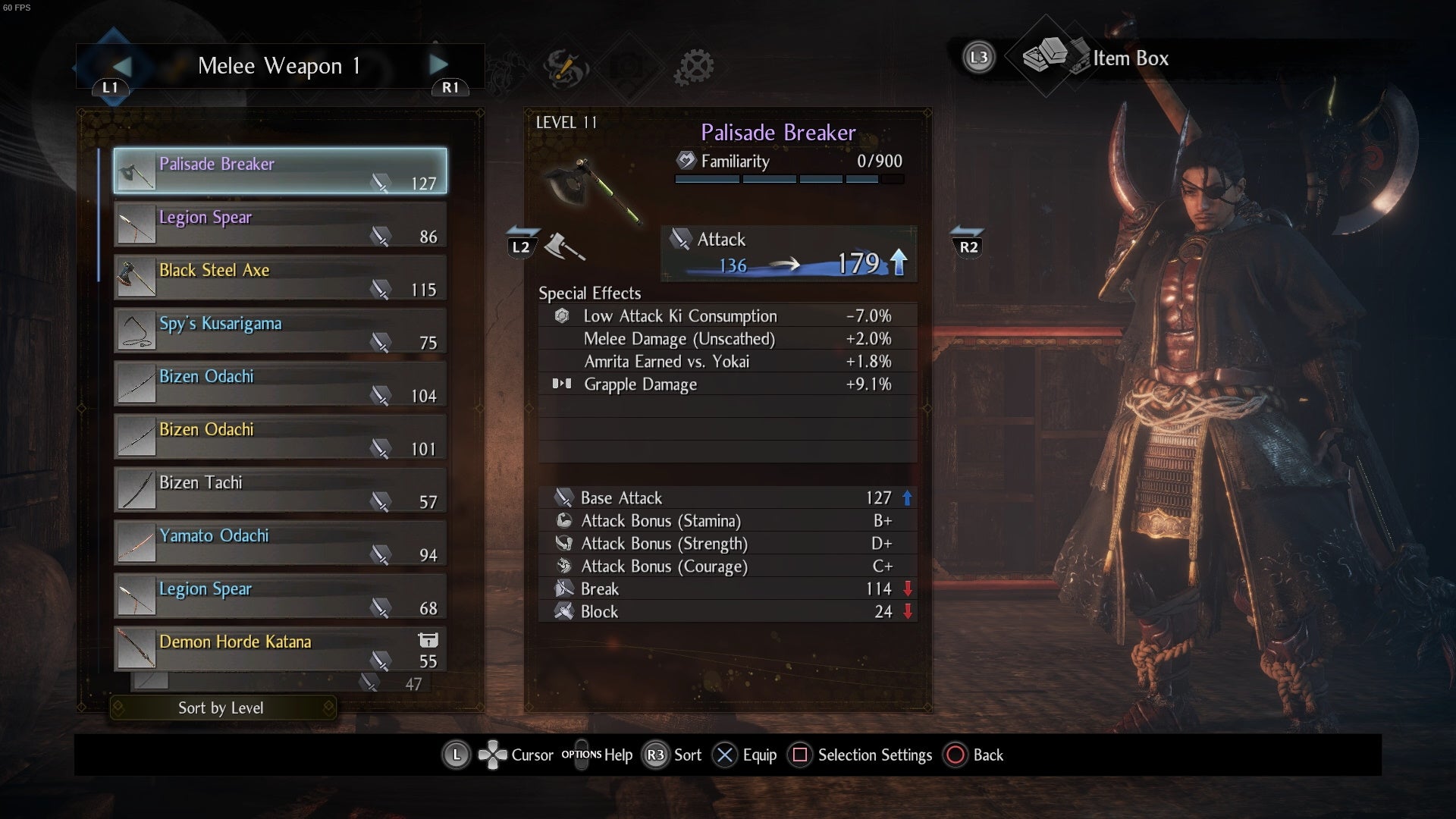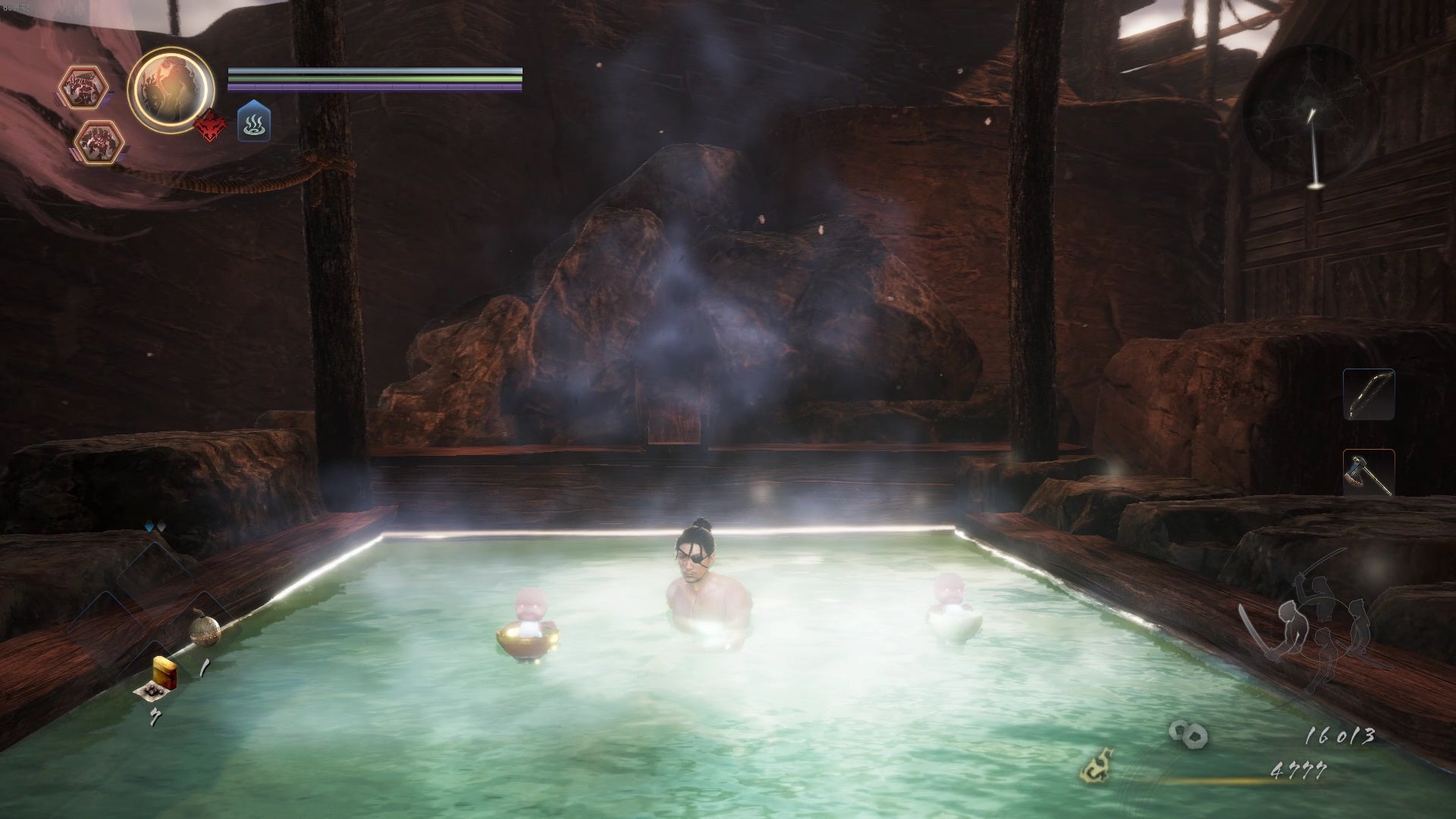Nioh 2: CE isn’t a new game, it’s just a buffer Nioh 2. This means it contains all three DLCs, runs faster than its PS4 counterpart, and has plenty of PC features. But its core still remains the same. Don’t expect any new regions to explore, or exclusive nunchucks to swing. For those who’ve already had their demon-slaying fill on PS4, it’s a difficult sell. But for budding yokai-bashers, you can’t go wrong with what’s on offer here. If you’re unfamiliar with Nioh 2, it’s a very difficult soulslike that trades the complexity of Dark Souls’ intricate environments for a greater emphasis on character customisation. The goal here is simple: fight demons, get loot, and build your dream warrior. Set in Japan and mostly acting as a prequel to 2017’s Nioh, you tear through flame-licked fortresses, twisting caverns, and bloodied bathhouses to rid the land of unsavoury yokai. Unlike Dark Souls, with its clockwork map that magically intertlocks with itself, and opens up as you explore it, Nioh 2 keeps things fairly linear. You’re less of an explorer here, and more of a yokai hitman. You pick missions from a world map, complete their objectives (which often involve eliminating a big monster), and move onto the next one. These monsters are good, imposing fun. Early on you come face to face with a lary horse-headed yokai called Mezuki, for example. This thing’s hacking at a lump of meat when you rock up, and it decides that you’re its next victim. Aside from being enormous, it swings its massive saw at you with this wild, genuinely frightening energy and impossibly long reach. It sets the tone nicely for the rest of the game, I think. After a compelling story between fights? Well, Nioh 2 ain’t interested. In fact, until replaying it for this review I’d genuinely forgotten a story even existed. From my understanding, you are a half-human, half-demon person (a “Shiftling”, to be precise) and, err, you approach all matters in 1500’s Japan with swords and axes.I don’t think it matters, though, as Nioh 2’s main draw lies in the sublime combat. Honestly, I’d say it’s leagues ahead of anything else in the soulslike space. You can flow freely between three stances: low, mid, and high. Each of these alter your moveset, so you can go from rapid strikes and quick dashes, to lumbering smashes and heavy rolls depending on the situation. Plus, combat in Nioh 2 is just effortlessly cool - no matter what weapon you choose, or how good you are at stringing together combos. I alternate between a flurry of swings and slashes with the kusarigama, then switch it out for the enormous odachi, a sharp blade with the reach of an elephant’s trunk and the impact of a double-decker bus. Two weapons from the DLC are given to you right off the bat, as well: Fists and the Splitstaff. They’ll appear throughout your playthrough, whether or not you’ve beaten the main game, and they’re fantastic to use. The Fists make you feel like Chun-Li on acid, while the Splitstaff is basically a handheld coffee grinder you burr enemies to death with. But to the uninitiated, Nioh 2’s not exactly a friendly teacher. It’s not going to hold your hand, or do up your tie for you. You must learn to dress yourself properly, child. There’s a lot of growing up to do, a lot of getting serious and learning from your mistakes. “You must apply yourself. Do you hear me?” the game bellows. And this sentiment extends to all the loot you’ll be lugging in your inventory. One of the great joys of Nioh 2 is hoovering up all the shiny weapons and armour that plop to the floor when you beat yokai or crack open chests. I find nothing more satisfying than sorting through it all, and marvelling at the stat increases. But this is something that I’ve learned to enjoy. Nioh 2’s combat isn’t the only thing that’s difficult; another is understanding what a trillion different terms and numbers actually mean. Much of Nioh 2’s most important information lies in the fineprint. Like an asterisk on the front of a shampoo bottle, it’s technically all there to decipher. You just need to comb through the game’s menus with a beady eye and a notebook handy to truly glean the most fun out of character customisation. With that said, I somehow managed to complete the first Nioh having only semi-paid attention to optimal stats and stuff. Mainly, I whacked on what looked cool and wielded whatever sword had the biggest numbers. So I’d say you can absolutely beat Nioh 2 just by throwing on sick threads, but come to the DLC and you might struggle. Each of the three DLCs adds new missions, bosses, and the like. But you have to reach them first. Only once you’ve beaten the main campaign do they unlock, which could be a bit of a bummer if you’ve employed the “I’m just gonna go with the vibes” approach to stats and skills management. Expect Nioh 2’s difficulty to go up a notch in the DLCs, too. Sure, you may not need an algorithmically sound samurai to survive, but it certainly helps to have tried (“You must apply yourself. Do you hear me?” echoes in the distance once more). But Nioh 2 has some challenges to overcome itself. Some players have reported frame rate issues across the board, with jarring dips during busy moments as well as incorrect keyboard and mouse button prompts, which is a big no-no in a game that places so much emphasis on precision during combat. Thankfully, I didn’t experience any of this myself, but it’s something to be aware of and I hope Koei Tecmo manage to fix it as quickly as possible. Elsewhere, though, Nioh’s shift to PC brings a lot of welcome upgrades. As well as support for 4K resolutions, HDR and ultrawide gaming monitors, it also has multiple frame rate options including 60fps and a whopping 120fps for those with powerful enough PCs. I only have a regular 1920x1080 monitor sadly, but my RTX 2070 was more than capable of running the game on maximum settings at 60fps, and I found that these higher quality settings gave environments a new lease of life compared to the PS4 version. Darker areas didn’t feel quite as muddy or restrictive, but more brooding and intense. Similarly, the way light bounces off trees or illuminates mountain tops is enough to make you want to stop and take a breather once in a while. It’s like I’ve got new lenses and I can finally appreciate the beauty of the world. That said, I wouldn’t say its graphics menu is particularly comprehensive. Most settings can only be turned on or off, while others such as Texture Quality only let you choose from Low, Medium, or High. As such, those with lower-end PCs may struggle to find a sweet spot, as there isn’t much to tinker with. I’d hesitate to renew that Nioh 2 prescription if you’re someone who’s already invested many hours into the PS4 version. Apart from the DLC and the swanky performance upgrades, you aren’t really getting anything actually new (apart from an RGB Valve helmet, I suppose). Having said that, I think Nioh 2: CE is absolutely worth it if you’re fresh to Nioh and like crunchy, combo-laden combat. Even moreso if you love stats and skill-trees on top of that.



